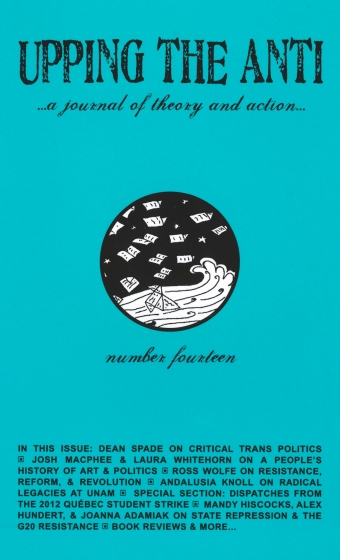Copwatching Everywhere
Dear UTA,
In “Their Eyes Were Watching Cops,” Joaquin Cienfuegos talks about his experiences of political organizing, specifically with Copwatch LA. As a member of Winnipeg Copwatch, I found his insights to be incredibly valuable.
Winnipeg’s Copwatch group has been active since 2006. Throughout its entire first year, we considered similar issues that are brought up in this article, and we continue to discuss and reassess them. These include questions about organizing in neighbourhoods that none of us live in; questions about what it means to be a predominately white group doing this sort of work, especially within racialized neighbourhoods; and questions about what outcomes, both negative and positive, our group’s tactics have in the short and long term.
Winnipeg Copwatch came together as a result of a collective trauma that resulted from a series of politically motivated arrests and police assaults. While many of us had been doing anti-state violence work prior to these events, this particular injustice brought in a much more personal level of anger and motivation to our work. The work became, in a sense, a way for many of us to heal from these experiences.
In the beginning, Winnipeg Copwatch worked alongside a group called the Manitoba Aboriginal Justice Equality Coalition (MAJEC). When the discussion of doing street patrols came up, members of MAJEC suggested that this was an area in which white members of Copwatch needed to participate. For many of us, patrols go against our instincts to run and hide from the police; instead, we are directly positioning ourselves in active and visible opposition to them. This doesn’t tend to put us on the police’s good side. MAJEC felt that, as Indigenous people, they were at higher risk of police repression and that white members should use their privilege in these situations.
These concerns and opinions were not taken lightly. Before going out on any patrols, we spent a lot of time talking about what it meant to be a predominantly white group of people going into racialized neighbourhoods for the purpose of copwatching. Our group had very few connections in place with these neighbourhoods. We were unsure about how to begin fostering relationships with these communities, and whether or not this was the best route to take. These are discussions that our group continues to have today.
In his article, Cienfuegos emphasizes Copwatch LA’s rule that “If you don’t live in a particular neighbourhood or weren’t invited to be there, you shouldn’t be doing copwatch there because you’re not going to face the repercussions.” I believe that this is one of the most important things for a Copwatch group to consider. Copwatch patrols often involve entering racialized and criminalized neighbourhoods with video cameras. We wanted to avoid having Winnipeg Copwatch enter neighbourhoods that we don’t have any personal connections with and risk making an embarrassing display of the patronizing white saviour complex. Rather than working in solidarity with these communities towards their safety, we risked acting like presumptuous superheros, swooping in heroically, filming the police, swooping out to the safety of our white privilege, and patting ourselves on the backs. All the while, just as Cienfuegos suggests, the people who live in these marginalized areas would be left to deal with the repercussions.
Winnipeg Copwatch also talked about how our presence with video cameras might affect certain underground economies, such as sex work. Our cameras can cause the people engaging in these economies to feel threatened, potentially resulting in them being pushed to more dangerous spaces. Fear of being videotaped and what that has often represented could put many people at risk. In these situations, our copwatching could do more harm than good.
We understand that in order for people to feel safe in our presence, and for our work to come from a place of solidarity rather than charity, a large portion of what we do needs to be about building and strengthening relationships, especially with those who routinely encounter the police. Consequently, before doing any patrols on the street, we spent an entire year getting to know people. We held healing circles, offered free workshops, gave out food, and provided spaces for people to talk critically about the police. We also held movie nights and went door-to-door (to organizations as well as peoples’ homes) to invite individuals and groups out to various events we organized.
I think the time spent building these relationships was invaluable. I also found that when we started to do the street patrols, we began to connect with a whole different group of people than those we had connected with through our events. People would see our “stop police brutality” patches and cross the street to come talk to us about their experiences with police. People would invite us into their homes, to parties, benches, and other hangouts, to share ideas on how to resist police brutality. We were able to build incredibly important relationships, many of which continue to exist today.
Since our first street patrol, we’ve grown a lot as a group. Of course we still have a lot to learn and will continue critiquing and processing the work we do and the way we do it. Thank you to Upping the Anti and to Joaquin Cienfuegos for encouraging these conversations.
In solidarity,
Alex Stearns
Winnipeg, MB

